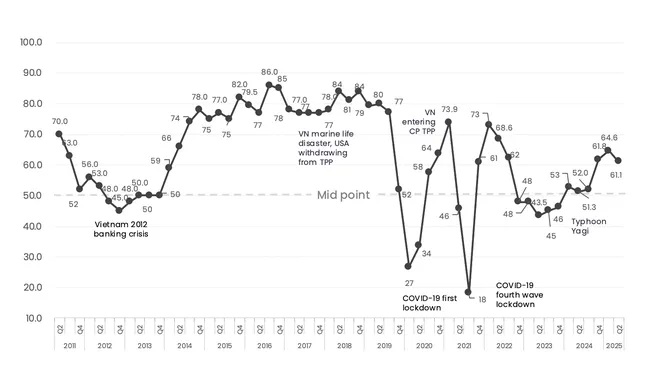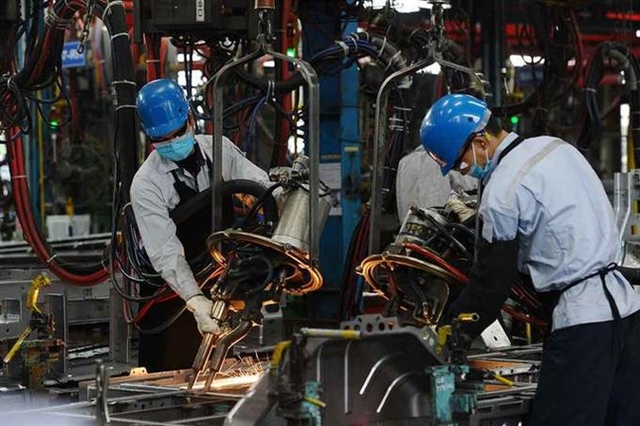Mr. Bruno Jaspaert, Chairman of EuroCham, asserted that the confidence of European businesses in Vietnam remains strong despite global trade fluctuations. According to the Business Climate Index (BCI) survey for Q2, nearly 72% of business leaders are willing to recommend Vietnam as an investment destination.
The Q2 BCI stood at 61.1 points, a slight decrease from the previous quarter. However, amidst escalating global trade tensions and supply chain pressures, the European business community continues to recognize Vietnam’s resilience.
 BCI Q2 stood at 61.1 points, a slight decrease from the previous quarter.
|
Feedback from the BCI survey this quarter highlighted businesses’ particular interest in developments related to tariff policies. The political and geopolitical landscape continues to evolve, but so far, the direct impact on European businesses operating in Vietnam has been relatively limited.
The report also showed that only 15% of businesses experienced negative financial impacts from supply chain risks, while 70% were not significantly affected. Enterprises highly appreciated the role of certificates of origin (C/O) in strengthening credibility and ensuring tariff preferences, especially after the Ministry of Industry and Trade took over and promoted the digitization of the C/O issuance process from May 2025.
According to the BCI survey, 56% of enterprises, mainly large-scale corporations, said they submit C/O documents monthly. This move has been highly regarded by the business community as it promises to reduce administrative procedures, shorten processing time, and integrate effectively with the electronic customs system and digital signatures.
“If Vietnam can develop a strong domestic supply chain and increase the proportion of goods actually produced in Vietnam, the country will be better positioned in the global competition. C/O is not just a ‘passport’ to enjoy tariff preferences, but also a symbol of credibility and trust in target markets,” emphasized the EuroCham Chairman.
Despite concerns about administrative procedures, most businesses expect business conditions in Vietnam to improve over the next five years. Among the existing administrative barriers, the procedure for obtaining work permits for foreign workers remains a prominent issue, mentioned by 33% of surveyed enterprises.
 Businesses expect business conditions in Vietnam to improve in the next five years. |
Additionally, regulations related to fire prevention and control (28%), investment and enterprise registration (28%), import and export activities (28%), taxation (26%), visa policies (21%), and land ownership (16%) are also administrative procedures causing difficulties in practical implementation.
EuroCham also reflected that FDI enterprises and foreign legal representatives could not register for VNeID accounts due to the lack of appropriate mechanisms. Meanwhile, the digitization of administrative procedures is carried out through the VNeID system.
“These barriers undermine Vietnam’s competitiveness as the region races to attract high-quality FDI. Removing these bottlenecks goes beyond administrative reforms and requires building a transparent legal framework, consistent and predictable policy orientation, clear division of responsibilities, and full accountability from relevant authorities,” said the EuroCham Chairman.
Viet Linh
– 10:03 30/06/2025
Vietnam Aims for a Competitive, Not Tax Haven, Financial Landscape to Lure Institutions
Are there any other adjustments you would like to make to this text? I can easily make further changes or provide additional content if you wish.
“Deputy Finance Minister Nguyen Thi Bich Ngoc emphasized that all international financial centers strongly avoid creating a ‘tax haven’ to attract financial institutions to their shores, and Vietnam is no exception. “





















